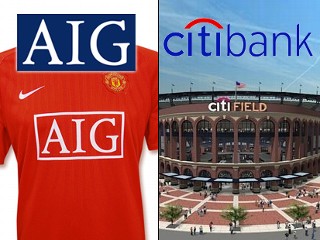Millionaire farmers continue to pluck crop subsidies they don't deserve, federal investigators say.
At least 2,702 farmers nationwide received subsidies between 2003 and 2006 even through they were making more than the $2.5 million gross income cutoff. The unwarranted payments totaled $49 million and exposed enduring Agriculture Department management problems, investigators concluded.
Wealthy continue to get farm subsidies, GAO finds
Citi, AIG Won't Drop Big Sports Sponsorships
 AIG, Citibank and a number of other federally bailed-out financial institutions have no plans to cancel hundreds of millions of dollars in sports team sponsorships, even as they take billions in taxpayer support, ABC News has found.
AIG, Citibank and a number of other federally bailed-out financial institutions have no plans to cancel hundreds of millions of dollars in sports team sponsorships, even as they take billions in taxpayer support, ABC News has found.
Struggling Citibank just sealed a multi-billion-dollar emergency "backstop" deal with the U.S. government. The financial behemoth, suffering with billions in bad mortgage-related assets on its books, recently shed 53,000 workers and saw its stock price lose over half its value. Yet it's in a 20-year contract to pay the New York Mets $400 million to name the team's new stadium "Citi Field."
TVNL Comment: So in essence you, the tax payer, subsidized the milti-million dollar baseball player, who PLAYS GAMES for a living! Not only that...they have made it so expensive to see games that many people can't afford to even go to a game anymore!
Government prepared to lend $7.4 trillion
The U.S. government is prepared to lend more than $7.4 trillion on behalf of American taxpayers, or half the value of everything produced in the nation last year, to rescue the financial system since the credit markets seized up 15 months ago.
The unprecedented pledge of funds includes $2.8 trillion already tapped by financial institutions in the biggest response to an economic emergency since the New Deal of the 1930s, according to data compiled by Bloomberg. The commitment dwarfs the only plan approved by lawmakers, the Treasury Department’s $700 billion Troubled Asset Relief Program. Federal Reserve lending last week was 1,900 times the weekly average for the three years before the crisis.
TVNL Comment: First of all the "Fed" is not government. What they are doing is stealing the money of the next ten generations! The only way to stop this is to end the Fed.
Former Regulator: Clear Fraud in Financial Crisis -- Why Isn't Anyone in Jail?
"There is no poster child [for the housing scandal] because you need to investigate, and you need to bring cases and we haven't done either against the major players," says William Black, Associate Professor of Economics and Law at the University of Missouri — Kansas City and a former federal regulator.
Black, who was counsel to the Federal Home Loan Bank Board during the S&L Crisis and blew the whistle on the "Keating Five" in 1989, says investigations have shown fraud incidence of 50% at (once) major subprime lenders like IndyMac and Countrywide.
World leaders dine in style as they discuss financial crisis
 The global economy may be undergoing a significant downturn, but the White House's dinner budget still appears flush with cash.
The global economy may be undergoing a significant downturn, but the White House's dinner budget still appears flush with cash.
After all, world leaders who are in town to discuss the economic crisis are set to dine in style Friday night while sipping wine listed at nearly $500 a bottle.
According to the White House, tonight's dinner to kick off the G-20 summit includes such dishes as "Fruitwood-smoked Quail," "Thyme-roasted Rack of Lamb," and "Tomato, Fennel and Eggplant Fondue Chanterelle Jus."
Humbled US agrees to share world's financial top billing
THE world's international financial institutions will be reshaped and worldwide regulatory and accounting rules reformed as a result of the G20 meeting.
The global leaders' 11-page statement spoke of broad principles, leaving the details to be worked out by aides before another summit meeting in April, after Barack Obama assumes the US presidency.
Chrysler leaders get millions
As Detroit's crumbling auto industry asks Congress for a bailout, Chrysler is in the awkward position of paying about $30 million in retention bonuses to keep top executives while the company cuts thousands of jobs.
Documents obtained by the Free Press show that at least six Chrysler executives are due to receive bonuses of more than $1 million apiece to stay through August 2009, the two-year anniversary mark of when private equity firm Cerberus Capital Management bought an 80.1% stake in Chrysler.
More Articles...
Page 57 of 69

 Economic Glance
Economic Glance






























